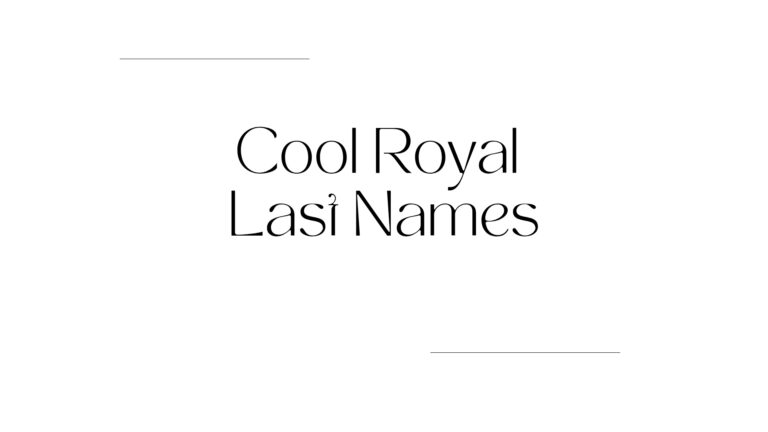100 Popular French Last Names
These last names provide abundant insight into the rich culture of France.
Each surname tells a unique story of geography, profession, or ancestry, perhaps owing to its aristocratic roots or humble beginnings.
These elite French last names evolved from a region in France, occupation, or even a character trait into well-established nomenclature with a sense of traditional identity over centuries.
In this blog article, we are going to explore common last names existing in France today, their meanings, and how they affect the way we define French culture and history.
French last names
Lemoine – Derived from “moine,” meaning “monk,” referring to someone who was a monk or lived near a monastery.
Dubois – Meaning “from the woods,” often referring to someone who lived near a forest.
Lemoine – Refers to a monk or someone connected to a monastery.
Lefevre – Meaning “the smith,” often associated with a blacksmith.
Dufresne – Refers to someone who lived near an ash tree or ash wood.
Boucher – Derived from the word “butcher,” indicating a person who worked as a butcher.
Gagnon – Derived from “gagner,” meaning “to win” or “to earn,” referring to someone who earned a living by hard work.
Beaufort – Derived from “beau” meaning “beautiful” and “fort” meaning “fortress,” often indicating a person who lived near a castle.
Delacroix – Meaning “of the cross,” referring to someone associated with Christianity or a church.
Lemoine – A surname derived from “monk,” someone who lived in a monastery or was involved with the church.
Leroy – Meaning “the king,” often indicating someone of noble or royal descent.
Moreau – Derived from “moros,” meaning “dark” or “swarthy,” possibly describing a person with darker features.
Petit – Meaning “small” or “little,” a common surname for someone of short stature or a younger person.
Charbonneau – Derived from “charbon” meaning “coal,” likely referring to someone who worked with coal.
Girod – Meaning “rule” or “ruler,” possibly denoting a person of authority or leadership.
Marchand – Meaning “merchant,” referring to someone who worked as a trader or seller.
Benoit – Derived from the Latin “Benedictus,” meaning “blessed,” indicating someone who was considered blessed.
Lemoine – From “moine,” meaning “monk,” denoting someone who belonged to a religious order.
Montagne – Meaning “mountain,” often referring to someone who lived in the mountains.
Durand – Derived from the Old French word “dur,” meaning “enduring” or “sturdy.”
Fournier – Meaning “baker,” referring to someone who baked bread or worked with flour.
Vidal – Meaning “life,” derived from the Latin “vita,” often given to someone who was vital or lively.
Clement – Derived from the Latin “clemens,” meaning “gentle” or “merciful.”
Perrin – Meaning “little Peter,” often a diminutive of the name Pierre (Peter).
Blanc – Meaning “white,” referring to someone with fair skin or light hair.
Chevalier – Meaning “knight,” referring to someone who served in the medieval cavalry.
Dufresne – Referring to someone who lived near an ash tree or ash wood.
Renaud – Derived from the Old French name “Reynald,” meaning “wise ruler.”
Barbeau – Meaning “bearded,” referring to someone with a beard.
Lavigne – Meaning “vine,” likely referring to someone who worked with vineyards or lived near them.
Boivin – Derived from the Old French “boivain,” meaning “drinker,” likely referring to a wine merchant or tavern keeper.
Leclerc – Meaning “the clerk” or “scribe,” often indicating someone who worked in administration or as a secretary.
Caron – Likely derived from “caron,” meaning “cart driver,” referring to someone who worked with a cart or wagon.
Tremblay – Derived from the word “tremble,” meaning “aspen tree,” referring to someone who lived near such trees.
Lalonde – Likely referring to someone who lived near a grove or small wood.
Ménard – Derived from the Old French “meinard,” meaning “brave” or “strong.”
Couture – Meaning “seamstress” or “tailor,” referring to someone who worked with fabric.
Lafleur – Meaning “the flower,” possibly indicating a person with a beautiful appearance.
Godin – Derived from “god,” meaning “godly,” indicating a person of religious devotion.
Jolivet – Meaning “little pretty,” referring to someone who was charming or attractive.
Laborde – Meaning “the farm,” possibly referring to someone who lived or worked on a farm.
Dumas – Derived from “du” meaning “of the,” and “mas,” meaning “house,” referring to someone who lived in a particular type of house.
Fleury – Meaning “flourishing,” referring to someone with a prosperous or blooming nature.
Bastien – Derived from “Sebastian,” meaning “revered” or “venerable.”
Guillet – Likely derived from “guillaume,” a variation of William, meaning “resolute protector.”
Deschamps – Meaning “from the fields,” referring to someone who lived near or worked on the fields.
Labbe – Meaning “abbot,” often a title for the leader of a monastery.
Morin – Likely derived from “moro,” meaning “swarthy,” describing a person with dark features.
Thibault – Derived from the Old Germanic “Theobald,” meaning “bold ruler.”
Dauphin – Meaning “dolphin,” but also a historical term for the heir apparent to the French throne.
Auguste – Derived from Latin “Augustus,” meaning “great” or “venerable,” often used for a person of dignity.
Fournier – Meaning “baker,” referring to someone who baked bread or worked with flour.
Lemoine – Meaning “monk,” possibly referring to a person who lived near a monastery or was involved in monastic life.
Gosse – Derived from “gosse,” meaning “child,” a nickname for a playful or young person.
Beauvais – Refers to someone from the town of Beauvais in northern France.
Clerc – Meaning “clerk” or “scribe,” denoting a person who worked in administrative roles.
Hamel – Meaning “small hammer,” referring to a person who worked as a blacksmith or craftsman.
Lemoine – Derived from the word “moine” meaning “monk,” indicating a connection to the religious or monastic lifestyle.
Mallet – Refers to someone who worked with a mallet or was a toolmaker.
Jacquet – Derived from “Jacques,” a French variation of “James,” meaning “supplanter.”
Verger – Refers to a “sexton” or “caretaker of a churchyard,” someone who maintained church grounds.
Fleury – Derived from the word “fleur,” meaning “flower,” likely referring to someone who worked with flowers or had a beautiful nature.
Blanchard – Meaning “white” or “fair,” possibly describing someone with fair skin or light hair.
Lavigne – Meaning “vineyard,” referring to someone who lived near or worked with grapevines.
Desmarais – Meaning “of the marshes,” likely referring to someone who lived near marshy land.
Gagné – Meaning “to win” or “to earn,” referring to someone who was successful or industrious.
Lemoine – Derived from “moine,” meaning “monk,” indicating a connection to religious life.
Boucher – Meaning “butcher,” referring to someone who worked in the meat trade.
Lefevre – Meaning “smith,” referring to someone who worked as a blacksmith.
Caron – Derived from the word “caron,” meaning “cart driver,” indicating a profession.
Lemoine – Referring to a monk or someone connected to a monastery or religious order.
Deschamps – Meaning “from the fields,” referring to someone who lived near fields or was a farmer.
Gauthier – Derived from the Germanic name “Waltari,” meaning “ruler of the army.”
Dufresne – Meaning “from the ash tree,” indicating someone who lived near or worked with ash wood.
Leclerc – Meaning “the clerk” or “scribe,” often referring to someone who worked as a writer or in administration.
Perron – Derived from the name “Pierre” (Peter), meaning “rock” or “stone.”
Chapelle – Meaning “chapel,” referring to someone who lived near a chapel or worked in a religious setting.
Barbeau – Meaning “bearded,” referring to someone with a beard.
Couture – Meaning “seamstress” or “tailor,” referring to someone who worked with fabric or clothing.
Paquet – Meaning “small package,” indicating someone who worked as a merchant or seller.
Renard – Derived from “renard,” meaning “fox,” referring to a person with fox-like characteristics (cunning or clever).
Chevalier – Meaning “knight,” referring to someone who served in medieval times as a mounted soldier.
Dumas – Derived from “du” meaning “of the,” and “mas,” meaning “house,” referring to someone who lived in a particular type of house.
Moulin – Meaning “mill,” referring to someone who worked in or lived near a mill.
Lambert – Derived from the Germanic name “Lindberht,” meaning “bright land.”
Vasseur – Meaning “farmer,” often referring to someone who worked the land.
Tardif – Meaning “late,” possibly referring to someone who was a late-born child or always late.
Bazin – Derived from the word “bas,” meaning “low,” indicating a person who lived at the foot of a hill or lowland.
Lepage – Meaning “page” or “servant,” referring to someone who worked in a noble household or as a servant.
Perrot – Derived from the name “Pierre” (Peter), meaning “rock” or “stone.”
Sauvage – Meaning “wild” or “untamed,” often referring to someone who was untamed or lived in the wilderness.
Lemoine – A surname meaning “monk,” indicating a person who was involved with the church or lived in a religious setting.
Vaillant – Derived from “vaillant,” meaning “brave” or “valiant,” referring to a person known for their courage or strength.
Charron – Meaning “cartwright,” referring to someone who made carts or wagons.
Benoit – Derived from “Benedictus,” meaning “blessed,” referring to someone who was considered holy or fortunate.
Leclair – Meaning “clear,” possibly describing a person with a clear voice or clear-minded nature.
Charrier – Derived from “char,” meaning “cart,” indicating a person who worked with carts.
Dufresne – Meaning “from the ash tree,” referring to someone living near an ash tree or who worked with ash wood.
Dulac – Meaning “from the lake,” indicating a person who lived near a lake or water source.
Lemoine – Derived from the word “moine,” meaning “monk,” indicating a connection to a religious life or institution.







